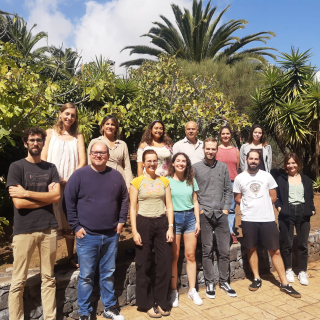Bibcode
Hoyos, Carlos; den Brok, Mark; Verdoes Kleijn, Gijs; Carter, David; Balcells, M.; Guzmán, Rafael; Peletier, Reynier; Ferguson, Henry C.; Goudfrooij, Paul; Graham, Alister W.; Hammer, Derek; Karick, Arna M.; Lucey, John R.; Matković, Ana; Merritt, David; Mouhcine, Mustapha; Valentijn, Edwin
Bibliographical reference
Monthly Notices of the Royal Astronomical Society, Volume 411, Issue 4, pp. 2439-2460.
Advertised on:
3
2011
Citations
65
Refereed citations
60
Description
We present a catalogue of structural parameters for 8814 galaxies in the
25 fields of the Hubble Space Telescope/ACS Coma Treasury Survey.
Parameters from Sérsic fits to the two-dimensional surface
brightness distributions are given for all galaxies from our published
Coma photometric catalogue with mean effective surface brightness
brighter than 26.0 mag arcsec-2 and brighter than 24.5 mag
(equivalent to absolute magnitude -10.5), as given by the fits, all in
F814W(AB). The sample comprises a mixture of Coma members and background
objects; 424 galaxies have redshifts and of these 163 are confirmed
members. The fits were carried out using both the GIM2D and GALFIT
codes. We provide the following parameters: galaxy ID, RA, Dec., the
total corrected automatic magnitude from the photometric catalogue, the
total magnitude of the model (F814WAB), the geometric mean
effective radius Re, the mean surface brightness within the
effective radius <μ>e, the Sérsic index n,
the ellipticity and the source position angle. The selection limits of
the catalogue and the errors listed for the Sérsic parameters
come from extensive simulations of the fitting process using synthetic
galaxy models. The agreement between GIM2D and GALFIT parameters is
sensitive to details of the fitting procedure; for the settings employed
here the agreement is excellent over the range of parameters covered in
the catalogue. We define and present two goodness-of-fit indices which
quantify the degree to which the image can be approximated by a
Sérsic model with concentric, coaxial elliptical isophotes; such
indices may be used to objectively select galaxies with more complex
structures such as bulge-disc, bars or nuclear components.
We make the catalogue available in electronic format at ASTRO-WISE and
MAST. Based on observations made with the NASA/ESA Hubble Space
Telescope, obtained at the Space Telescope Science Institute, which is
operated by the Association of Universities for Research in Astronomy,
Inc. under NASA contract NAS 5-26555. These observations are associated
with programme GO10861.
Related projects

Traces of Galaxy Formation: Stellar populations, Dynamics and Morphology
We are a large, diverse, and very active research group aiming to provide a comprehensive picture for the formation of galaxies in the Universe. Rooted in detailed stellar population analysis, we are constantly exploring and developing new tools and ideas to understand how galaxies came to be what we now observe.
Ignacio
Martín Navarro